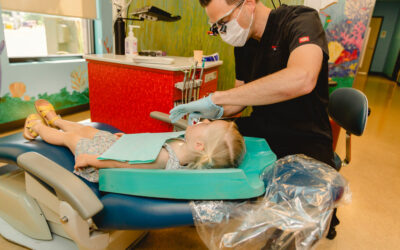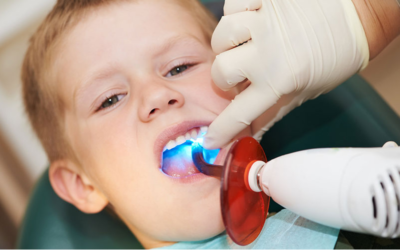Bruxism: Why is My Child Grinding Their Teeth?
You’re not alone if you’ve noticed your child is grinding their teeth. In fact, according to research, almost 50% of children will grind their teeth at night. Typically, they are unaware they’re doing it, so parents need to pay attention to the signs.
While teeth grinding, or bruxism, usually resolves on its own, knowing the causes can help you get your child relief. Not only can it be painful, but it can also cause lasting effects such as chipped teeth and chronic pain. So, let’s look at what teeth grinding is and its causes.

What is Bruxism?
To start, bruxism is the medical term for teeth grinding and clenching. There are two types of bruxism, which can happen when asleep or awake. Teeth clenching will happen while they’re awake, and teeth grinding will happen while they’re sleeping. If you’re concerned that your child may be grinding their teeth, look out for these signs:
- Grinding or popping noises
- Tooth sensitivity
- Complaints of jaw pain
- Unusual wear and tear of the teeth
- Earaches and headaches
When your child starts to show these signs, consult with your dentist as soon as you can. You’ll need to find the underlying cause of teeth grinding in order to help your child find relief.
The Causes of Bruxism in Children
There are several potential causes of bruxism in children, from psychological to environmental factors. Research also shows that male children are more likely to have teeth-grinding problems than females.
Stress
Stress is linked to bruxism, but it’s unclear which causes the other. Kids have plenty to be stressed about, from school work to life changes such as a move. A study showed that toddlers facing stress were more likely to experience teeth grinding while asleep. So, in this case, the stress caused the bruxism.
In another study focusing on children in school, they were clenching their teeth as a way to deal with stress, such as school work. While more research needs to be done, the current data shows a link between stress and bruxism in children.
Jaw Misalignment
When your child’s teeth don’t align properly, it can cause problems such as bruxism. The jaw imbalance can make teeth grinding and clenching worse but may be resolved with braces. In some cases, a malocclusion may need to be remedied with surgery.
Sleep and Mental Disorders
Other common causes of teeth grinding in children are sleep and mental disorders. According to the Sleep Foundation, bruxism is more likely to occur in children with conditions such as:
- Attention Deficit Hyperactivity Disorder (ADHD)
- Migraines
- Sleep Disorders
What Can Happen if My Child Grinds Their Teeth?
Generally, children will outgrow bruxism, and it will not cause long-term effects. They might go through a period where they grind their teeth, and neither you nor your child notices it. If it goes untreated, however, your child may have lifelong problems from teeth grinding, including:
- Chipped teeth
- Worn down enamel
- Teeth sensitivity
- Face pain in the jaw and ears
- Headaches
- Earaches
How is Bruxism Treated?
Once you notice signs of bruxism, you should consult with your child’s dentist. Depending on the severity, your dentist may prescribe a night guard to prevent teeth grinding. If your child is having trouble sleeping, a sleep aid may also be prescribed. When their bite is misaligned, braces are used to correct the bite which should solve the issue, as well.
What Can You Do at Home?
After the cause of bruxism is found, there is plenty you can do at home as a parent to help. For teeth grinding at night, make sure that your child is relaxed and ready for rest. If you notice your child is stressed, ask them about it to find a way to fix it.
Sometimes the cause of bruxism may be simple to remedy, and other times not. For example, if your child is going through a big change, such as switching schools, you may need to offer them extra support to keep them from grinding their teeth
If there are any major concerns, always consult with your physician before attempting to treat teeth grinding in your child at home.



